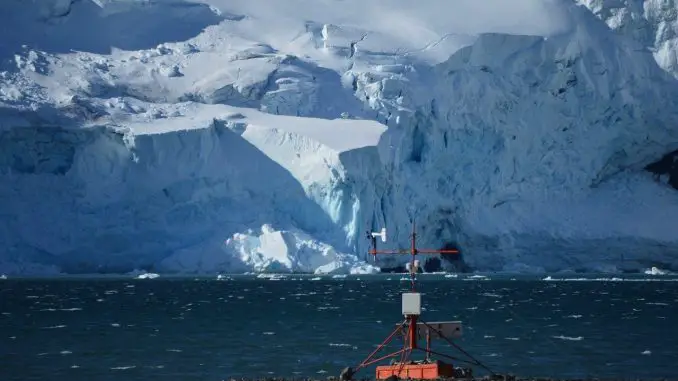
The answer to the heading’s question is “no” if “ever” is interpreted literally. The earth has a long history, climate change has been going on almost all the time, and sometimes it has gone faster than in recent decades.
But “ever” is now often used in the meaning “since the measurements began”. But then it is the question when the measurements should be considered to have started. Almost globally comprehensive temperature measurements began with satellite data from December 1978. However, the measurements are usually considered to have started in 1850 or 1880, when known temperature series begin.
One of these well-known temperature series is HadCRUT4, a collaborative project between two British institutes, where the Hadley Center stands for sea temperatures and CRU for land temperatures. The 4th stands for it is the fourth version of the temperature series.
This temperature range has at least two significant heating periods. Let’s compare these two:
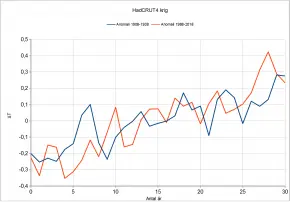
Here I have calculated the annual average temperatures for both periods and then calculated the anomalies for each year, ie the difference between each year’s average and the period’s annual average. I have done this here, and for the other temperatures I will show, because I am interested in how fast the temperature changes have gone during each period. However, I am not interested in how the temperatures have varied between periods.
Is there any significant difference between these two periods in HadCRUT4? Except when it got warmer between the first and the second period? But now, as I said, I focus on how fast the changes went in each time period.
If you had not had the explanation at the top of the chart, would you have easily been able to determine which data set belongs to the period 1908-38 and which one belongs to 1988-2018?
By the way, I downloaded the data for HadCRUT4 from Climate Explorer.
There is a temperature range based on data from thermometers from parts of the world that goes farther back to the middle of the 19th century. These are land-based temperatures from BEST, which probably stands for Berkeley Earth Surface Temperatures. This data is also available on Climate Explorer.
For some land areas, BEST starts as early as 1750. I experimented with different latitude bands in Climate Explorer and eventually found one where its computer system accepts that there is enough data. I found there three periods where the heating seems to have gone about as fast as the past few decades. Here is a comparison between these four periods:
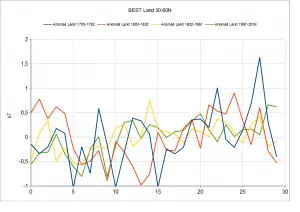
Is there really any significant difference between the modern warm-up period and the earlier ones? The modern depends, if we are to believe in the climate activists, entirely or almost entirely on greenhouse gas emissions. While in the past they may not have had such as cause.
The longest temperature series based on thermometer data is CET, Central England Temperatures. So it only applies to a small part of a country. Because it extends over such a long time, it is nevertheless interesting.
Two periods of warming, one of which has occurred recently, are shown in this diagram:
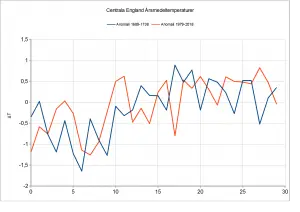
The early period, 1698-1738, when heating could not have been due to greenhouse gas emissions, which until then had been negligibly small. But in recent decades, warming is due to greenhouse gas emissions and has been exceptional. Or?
One way of obtaining temperatures from before the thermometers’ age is to drill in glacier ice. One of the longest temperature series obtained in this way is from a project, GISP2, in the interior of Greenland. It goes back over 50000 years in time. However, there is no data for the past decades. Therefore, I have had to do something that should not really be done: Compare data from different measurement methods. To represent modern times, I chose temperature data from the weather station in the community Angmagssalik. These I compared with periods of seemingly large and rapid warming in GISP2 data, according to a compilation of the last 4000 years.
Formally, these GISP2 data are annual averages. When looking at how the data looks, it is clear that most of these annual averages are actually linear interpolations between years when there is actually data. Therefore, this time I chose a longer time period for the comparisons:
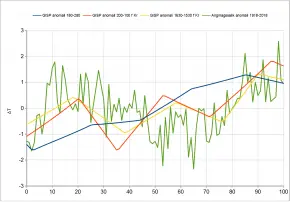
Is there really any crucial difference between the modern period, with its alleged impact from greenhouse gas emissions, and the other periods, when greenhouse gas emissions may not have affected the climate?
If I should end with my opinion, with my answer to the headline question, then it is: No, climate change is not going faster than ever! That’s my opinion. Anyone else perhaps draw a different conclusion from the data I present?
Leave a Reply